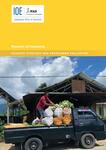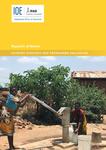Page Header

Downloads:
1
Arab Republic of Egypt Country Strategy and Programme Evaluation
Overview
This evaluation covers the IFAD-supported country programme and strategy in Egypt for the period 2005 to 2016. Egypt is the largest borrower among the 22 countries in the Near East and North Africa region in which IFAD operates (15.8 per cent). The country programme has achieved some notable impacts, especially in improving farming systems in the old lands, and improving water and land management practices in the new lands, which are certainly key to enabling poor rural farmers to increase their production and their productivity. The focus on similar rural development issues has held steady over a long period, but opportunities to learn from this long-term engagement have been missed. During this period, the Government became more demanding in what it expects from increasingly expensive loans. Moreover, the scale of the challenges it needs to address will require more diverse and innovative solutions. For IFAD, this means that replicating well-tested approaches will not be sufficient. The Fund will need to sharpen its strategic focus, push for greater innovation, join forces with a wider range of partnerships, and ensure broad-based government ownership throughout its interventions.Report Details
| Year Published | |
| Type | |
| Joint | No |
| Partner/s | N/A |
| Agency Focal Point | Johanna Pennarz |
| Focal Point Email | j.pennarz@ifad.org |
| Managed by Independent Evaluation Office | Yes |
| Country/ies |
YOU 'RE READING
Arab Republic of Egypt Country Strategy and Programme Evaluation








